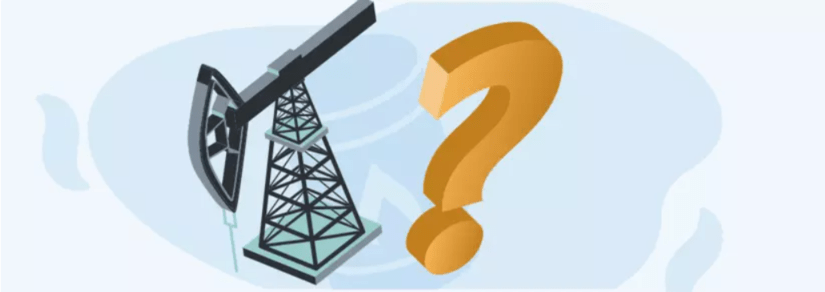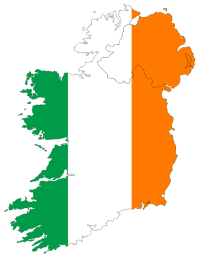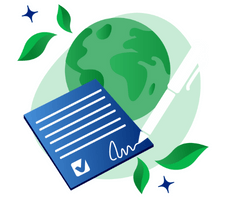Fracking in Ireland: Why Is It Controversial?

Since the 1950s, fracking has long been a controversial method of extracting oil and gas. We examine in closer detail what it is exactly, how it is used in Ireland, and why fracking in Ireland is so controversial.
| Fracking Pros | Fracking Cons |
|---|---|
| More gas and oil reserves | Water contamination |
| Self-sufficiency | Earthquakes |
| Reduced coal production | Industrialisation |
| Jobs creation | Ecological destruction |
| Energy security | High water consumption |
| Reduced water intensity | Carbon emissions |
Looking to Save Money On Your Energy Bills? Call Selectra Today To Start Saving.
Rated ⭐⭐⭐⭐ on Trustpilot So You Know Selectra Customers Get Energy Advice You Can Trust!
Call Today to Switch Energy Providers and Save On Your Energy Bills
We're currently closed but please leave us your number and we'll give you a free callback as soon as we're open!
What Is Fracking?

Fracking, or hydraulic fracturing - the process from which the name derives - is an unconventional extraction method used to release fossil fuel (oil and natural gas) deposits from deep within the Earth’s surface. The most popular extraction using hydraulic fracturing is natural gas.
Fracking has always remained controversial due to its potential impact to the environment due to the fear it causes earth tremors and environmental concerns but in light of the ongoing energy crisis and the increasing price of wholesale gas, there has been a renewed case for fracking as a solution to the gas shortage in order to bring down prices.
What are fossil fuels? Fossil fuels are products of natural processes that turn organic matter into gaseous hydrocarbon, oil and coal deposits over millions of years. When extracted and refined, these deposits are combusted to generate energy. Crucially, fossil fuels are finite and carbon-intensive from extraction to end-use.
How Does Fracking Work?
Fracking relies on immense drilling operations to reach sedimentary rock formations called shale, and high-pressure water pumps to release oil and natural gas trapped inside. The oil and natural gas are extracted, stored, and refined to be used for energy generation and consumption.
Drilling
The fracking process begins with intermittent vertical drilling to create a borehole of up to 10,000 feet in depth - the equivalent of eight Empire State Buildings - which gets encased in several layers of cement and steel. The casing works to prevent water migration and the collapse of the borehole walls.
At the lowest depths, when the targeted geological layer has been hit, the borehole curves 90 degrees to facilitate horizontal drilling along the shale formation. Horizontal drilling reduces surface impact and allows for wider shale coverage, thus improving production.
High-Pressure Water Mixture
Once drilling is complete, a fracking liquid made of water, sand and various, potentially hazardous chemicals is directed through the borehole to the shale rock at high pressure. This creates fractures in the rock formation. Oil and natural gas are released from the consequent fissures and flow to the surface, at which point they are separated and stored.
What is shale?Shale is a sedimentary rock created by the compression of clay and silt at the bottom of a lake or sea. It is composed of fine layers, resulting in a flaky rock which can be easily split.
Is There Fracking in Ireland?

Fracking has been completely banned in Ireland since 2017. A bill proposing its prohibition was introduced in 2016 and 62% of the Dáil voted in favour of it. The parties in favour of outlawing fracking were Fianna Fáil, the Green Party, Independents 4 Change, Labour, and Sinn Féin.
How did the Irish manage to get fracking outlawed under heavy international pressure from large corporations? Two factors contributed to the downfall of fracking in Ireland. One was the furor over the Corrib gas field. The Corrib gas project extracts natural gas off the coast of northwest Ireland and transports it on land via a pipeline, to a gas processing plant.
Who Opposed Fracking in Ireland?
The project faced heavy opposition from local residents, concerned by the proximity of the pipeline to their homes. Shell, one of the major bankrollers of the project, also requested that several protestors be jailed, and irregularities and issues with planning permission have beset the project.
Awareness of all the issues was then heightened by the documentary “The Pipe”, leading to public anger and an increased perception of the impact of such projects on communities and the environment. Also highlighted was the fact that if people banded together, grassroots movements could change the course of such controversial projects. In 2017, Shell actually sold its 45% stake in the beleaguered Corrib project, taking a loss of $1 billion.
Due to Corrib, a large number of environmental activists had already mobilised in Ireland and were on the ground ready to confront fracking when the issue first arose. Lessons learned in the campaign against Corrib were also key, as campaigners sought to prevent the division and conflict suffered in Corrib communities.
The second major contributing factor to Ireland's mobilising against fracking was the influence of similar campaigns and studies against it emerging from North America (where fracking is legal), at that time. Jessica Ernst, an American prominent anti-fracking campaigner and oil patch environmental consultant, was particularly influential.
Looking to Save Money On Your Energy Bills? Call Selectra Today To Start Saving.
Rated ⭐⭐⭐⭐ on Trustpilot So You Know Selectra Customers Get Energy Advice You Can Trust!
Call Today to Switch Energy Providers and Save On Your Energy Bills
We're currently closed but please leave us your number and we'll give you a free callback as soon as we're open!
Why Is Fracking Controversial?

Earth tremor concerns, chemicals contaminating groundwater, and investing in fracking instead of renewable energy, are all reasons that contribute to fracking’s controversial reputation in Ireland. Opponents have argued that states shouldn’t be committing money to extract more fossil fuels while at the same time committing to lower greenhouse gas commissions.
When Ireland banned onshore fracking in 2017, it joined Bulgaria, France, Germany, and the Netherlands. Northern Ireland, Scotland and Wales have all put in place suspensions of fracking, leaving England the only fracking location in northwest Europe. In 2011 France was the first European country to ban fracking, sending shockwaves through the European community.
The chemicals used in fracking are mainly for protecting the machinery in operations but concerns have pointed out the possible and probable contamination of water at fracking sites. The issue is also that some sites are more suitable for fracking than others - Ireland has a proliferation of underground water systems, aquifers, rivers and lakes, which make water contamination much more probable.
What Are the Advantages and Disadvantages of Fracking?

Fracking increases the amount of oil and gas recovered from sites due to enabling access to previously inaccessible reserves. In the US, fracking has boosted oil and gas recovery and decreased prices for consumers. However the US' landscape is much flatter than Europe’s, and easier to carry out fracking on, when compared to Europe’s more “crumpled” landscape. Another advantage of fracking is that due to its nature, many jobs are also created in order to carry it out, largely in rural areas where employment opportunities are scarce.
Supporters of fracking say it could be used as a solution to transition to renewable energy, bridging the gap between fossil fuels running out and renewable energy scaling up enough to meet demand. They’ve also ventured that the money fracking brings in could be invested in research and harnessing renewable energy.
Finally, it can also be argued that changes in modern fracking practices have ruled out many of the disadvantages associated with it in the past.
Advantages of Fracking
- Access to more gas and oil reserves
Accessing oil and gas from shale, though still finite, helps mitigate the exhaustion of oil and gas resources from conventional extraction methods. With fracking, Ireland wouldn't need to worry about running out of fossil fuels in the future and also benefit from lower gas prices since it would increase the supply. - Reduced coal production
Development of fracking operations would allow Ireland to reduce its production of coal for electricity. Coal is the dirtiest of all fossil fuels when it comes to electricity generation. This could help somewhat mitigate the climate crisis and potentially meet upcoming carbon emissions targets as natural gas produces around 50% less carbon emission than coal and could be a more realistic alternative to renewables. - Jobs creation
Fracking jobs could bring new opportunities to rural areas where Irish shale gas and oil deposits primarily lie. - Energy security
Natural gas from fracking can be used in cleaner gas-fired power stations to make up for any shortfalls in solar and wind electricity production that are unavoidable with changing weather patterns. Natural gas obtained from fracking can help sustain a strong energy supply from renewable sources. - Reduced water intensity compared to coal
Studies of fracking operations in the United States have shown that the amount of water used to produce a unit of energy (water intensity) in the first 12 months of production is less than half the amount used in coal extraction.
Looking to Save Money On Your Energy Bills? Call Selectra Today To Start Saving.
Rated ⭐⭐⭐⭐ on Trustpilot So You Know Selectra Customers Get Energy Advice You Can Trust!
Call Today to Switch Energy Providers and Save On Your Energy Bills
We're currently closed but please leave us your number and we'll give you a free callback as soon as we're open!
Disadvantages of Fracking
- Water contamination
Chemicals used in the fracking process are potentially toxic and could contaminate local water supplies or cause pollution on the surface. In the United States, for example, toxic fracking water spewed unabated for more than 12 hours at a site in Pennsylvania. Additionally, a study by researchers at Duke University revealed that drinking water near fracking sites in Pennsylvania and New York contained dangerous levels of methane. - Earthquakes
Earthquakes triggered by fracking have been recorded near Blackpool in 2011, shortly before the introduction of a six-year moratorium, and in 2019 before the latest ban. A 2.3 magnitude tremor was recorded near the Preston New Road site in April 2011, followed by a 1.4 magnitude tremor the following month. In August 2019, a 2.9 magnitude earthquake was recorded at the same site. - Industrialisation
Many fracking proposals face opposition from local communities due to concerns over industrialisation of rural areas. Critics claim that fracking will result in noise pollution and much heavier traffic with a great number of trucks hauling equipment and water waste, causing higher levels of air pollution in turn. - Ecological destruction
Fracking sites risk disturbing, reducing, damaging, fragmenting or entirely destroying local habitats, threatening the wildlife dependent on them. - High water consumption
A 2016 study in the UK revealed that the amount of water used to produce a unit of energy in the first 12 months of fracking production is less than half the amount used in coal extraction, also shows that water intensity sharply increases after the first 12 months. In some cases, water intensity exceeds that of coal. On average, 10 - 35 million litres of water may be used to frack a single well. - Carbon emissions
Fossil fuels extracted by fracking still emit dangerous amounts of greenhouse gases that contribute to and perpetuate the climate crisis. Relying heavily on these fuels makes it harder to meet the net-zero carbon emissions targets. To make things worse, environmental studies claim that reductions in greenhouse gas emissions anticipated by switching from coal to gas may not happen. - Stunting renewables
Investing heavily in fracking at the expense of renewable energy production endangers future green gas, wind, and solar projects, such as solar photovoltaic energy, which are more sustainable by nature and design. To reach our climate targets and to allay the current climate crisis, serious investment in and development of renewables is required.
Does Fracking Cause Earthquakes?

As mentioned above, In 2011 a company carrying out fracking operations in an area close to Blackpool in the UK had to stop operations after a series of small earthquakes (1.5 and 2.2 on the Richter scale) in the area. A later study concluded that it was very probable the tremors had been caused by fracking.
The British Geological Survey says that the small earthquakes (too small to be felt) generally accompany hydraulic fracturing. Regarding the earthquakes near the Blackpool fracking site, it’s important to remember that earthquakes that score less than 2 on the Richter scale generally pass unnoticed. Fracking is not the only cause of minor seismic events, mining is usually the most common culprit. Companies which carry out fracking in the UK have now committed to pausing operations if tremors of 0.5 magnitude occur.
One might think that it is the action of breaking apart rock and causing reverberations that cause earthquakes, but it is now believed that the disposal wells for fracking water are the main culprit. Injecting the wastewater into these disposal wells is seen as the most cost-effective way to dispose of the chemically-laden liquid.
However, injecting wastewater can significantly increase pressure levels over much larger areas than those where fracking is being carried out.
Looking to Save Money On Your Energy Bills? Call Selectra Today To Start Saving.
Rated ⭐⭐⭐⭐ on Trustpilot So You Know Selectra Customers Get Energy Advice You Can Trust!
Call Today to Switch Energy Providers and Save On Your Energy Bills
We're currently closed but please leave us your number and we'll give you a free callback as soon as we're open!
Is Fracking Good or Bad?

Overall, there is still a lot to debate over the potential usefulness and ethics of fracking, but in conclusion we believe there are short-term and long-term considerations for fracking.
Fracking in the Short-Term
Under the strain of the climate crisis and the government’s drive for net-zero carbon emissions, the need to invest in renewable energy alternatives has dominated the energy strategy. In the light of many of the downsides of fracking, this does seem to be the right direction that makes sure we remain ethical in our energy transition.
However, with the rising price of natural gas and the ongoing energy crisis, it is questionable whether our renewable sources are capable of providing the electricity to meet demand. Fracking would increase the natural gas supply and drive prices down making it easier for customers to pay for the energy they need.
Additionally, many of the failures of fracking stem from poor regulation and therefore a more cautious and controlled fracking industry could mitigate many of the problems.
Fracking in the Long-Term
In the long-term however, green gas biofuels produced by decomposing organic matter, green hydrogen, wind farms, solar energy harvesting, and tidal power are viable alternatives to fracking that, with the right investment and policy management, could displace our reliance on fossil fuels and cut carbon emissions.
What's the Conclusion on Fracking in Ireland?

How far is too far in our quest to extract every last drop or molecule of fossil fuel from the planet? Or are the health and environmental risks associated with fracking just the result of sensationalist coverage?
Money spent on researching areas suitable for fracking, and policing areas where fracking occurs (due to high levels of protest from locals) could indeed be spent on more research and investment in fossil fuels. However the same could be said for exploration licences for oil and gas, which continue to be granted in Ireland.
The key takeaway from contentious issues such as fracking is that these situations may not even become issues if we bear down on applying sustainable energy practices both at home and across industry, increasing our use and support of renewables.
Even the best home practices concerning energy use and recycling are only the tip of the iceberg and pale into significance if not combined with similar practices across industry and commercial sectors. Apple, which is a major game player in the communication and entertainment device industry, announced in 2018 that its global facilities are now 100% powered by renewable energy, and if they can do it, others certainly can and should.
If nothing else, the lessons learned at Corrib in combating fracking show that pressure can be successfully applied to corporations in support of the environment. Whether you support fracking or not, we can now be brought to bear on industrial players in Ireland, ensuring we all move towards a greener future, together.
Find out more about our offers from energy, broadband and waste collection providers!

